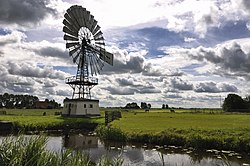Helland
| Helland | |
| File:Flag-east.png Flag | |
| Country | File:Flag vyv.png Vyvland |
| Capital | Heersduik |
| Largest City | Heersduik |
| Population | 1,484,936 |
| Area | 18,590km² |
| Population density | 80/km² |
| Government | Helish Union-Conservative-Liberal-KDH-Capitalist coalition |
| Chancellor | none |
| Parliament seats | 30 |
| Official languages | Helish, Vyvlander |
| Number plate code | E |
Helland (pronounced /hɛlənd/; Vyvlander: Hellaan, /eläːn/; Helish: Helland, /ɦelɑnt/) is the easternmost province of Vyvland. It is situated in the country's north-east, and is notable for the fact that it is the only area where Helish is the majority language. The capital city is Heersduik, which lies on the coast in the centre of the province.
Etymology
The name Helland derives from the Helish people who inhabit it. Their name in term derives from early Vyvlander whelisk, meaning foreign, from Proto-Germanic *walhiskaz, meaning foreign.
History
Historically, Helland has been settled by Helish people, who are genetically and linguistically closely related to Vyvlanders, at the end of the ninth century AD. The settlers spoke a language closely related to the Hedish spoken in the Grand Duchy of Hedland, a realm in the southeast of the Nevan archipelago, which itself to Vyvland's northwest. Helland remained independent until the 1300s, when it was gradually conquered by Eylav fi Paavyl, although it continued to receive a large degree of autonomy under Vyvlander rule. Helland's population grew significantly when Hedland was incorporated into Nevanmaa by Yrjö I in 1617, due to a trickle of Hedish immigrants dissatisfied with perceived subjugation to Nevans.
In the following centuries, increased central control of Helland began to homogenise the inhabitants and their culture. The Helish language was seen as backward and uncivilised by many within the province, especially upper- and middle-class residents, who often began to speak Vyvlander. The local Helish dialect and identity remained stigmatised until well into the twentieth century. However, reforms under North Vyvlander Prime Minister Gunfre Smef-Hoyg in the early 1970s elevated the status of the language, and it thus began to reverse its previous terminal decline. The following decades have seen an increase in migrant population in the province, especially including monarchists fleeing from Unolia during and after the Unolian Civil War.
Geography

Geographically, the province consistes of a coastal range of low mountains breached at Heersduik, with a large alluvial plain lying inland to the west. The population is densest in the centre of the province due to the ample transportation links, such as the A1 motorway and railways to Vlud and Mafiy. Cities such as Halperinge, Noordbos, Broomschij and Haalsvrum, many of which have large service and commuter sectors, are situated in this area. The River Wik flows southeastwards, with its mouth at Vlaardingen. Much of its plain is liable to flooding, even after long-term draining efforts. The Hoyger peninsula to the south of Vlaardingen is the furthest southerly point of the province and easterly point of Vyvland.
Politics
The province is represented by 30 members in the National Parliament. These seats are held of a diverse range of parties which can broadly be divided into two "camps"; the Autonomy camp (Sulvregnenggrynd), whose primary goal is to see Helland gain a greater degree of autonomy; and the National camp (Nazonalgrynd), who wish to retain the current position as a standard province. There is a slight bias towards right-wing parties in the Autonomy camp and left-wing in the National camp, although parties from both sides of the left-right axis are represented in both camps. The current Provincial Diet is controlled by a Helish Union-Conservative-Liberal-Christian Democrat-Capitalist-Libertarian coalition. Due to the province's relatively unstable political situation, no Chancellor is elected.
Nationally, the Autonomy camp is aligned with the Alliance for Independence political bloc and consists of the centre-left Helish Union and centre-right Helish People's Party (6 national seats each), in addition to the centre-right Christian Democrats of Helland and the right-wing Helish Front (2 seats each) - this makes 16 seats in total. The National camp returns 12 members to Parliament, comprising of four Liberals, three each from the National Party and Socialist Party, and one each from the Conservative Party and Capitalist-Libertarian Party. The Greens, who hold two seats, officially belong to neither of the two camps, although they are often identified as being pro-National.